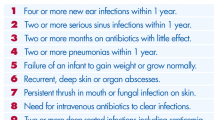Abstract
Primary immunodeficiency disorders (PIDs) are rare inborn errors of the immune system. Patients with PIDs are unique models that exemplify the functional and phenotypic consequences of various immune defects underlying infections, autoimmunity, lymphoproliferation, allergy and cancer. Over 150 PID syndromes were characterized in the past 60 years, with an ever growing list of new entities being discovered. Because of their rarity, multi-center collaboration for pooled data analysis and molecular studies is important to gain meaningful insights into the phenotypic and genetic diversities of PIDs. In this article, we summarize our research findings on PIDs in Chinese population in the past 20 years. Close collaboration among various immunology centers, cross-referrals and systematic data analysis constitute the foundation for research on PIDs. Future directions include establishment of a national PID registry, raising awareness of PIDs and securing sufficient resources for patient care and scientific research.
Similar content being viewed by others
Author information
Authors and Affiliations
Corresponding author
Rights and permissions
About this article
Cite this article
Lee, P., Lau, YL. Primary Immunodeficiencies: “New” Disease in an Old Country. Cell Mol Immunol 6, 397–406 (2009). https://doi.org/10.1038/cmi.2009.51
Received:
Accepted:
Issue Date:
DOI: https://doi.org/10.1038/cmi.2009.51
- Springer Nature Limited
Keywords
This article is cited by
-
Caucasian Origin of Disease Associated HLA Haplotypes in Chinese Blood Donors with IgA Deficiency
Journal of Clinical Immunology (2014)
-
Distribution and Clinical Features of Primary Immunodeficiency Diseases in Chinese Children (2004–2009)
Journal of Clinical Immunology (2011)
-
Molecular Diagnosis of Severe Combined Immunodeficiency—Identification of IL2RG, JAK3, IL7R, DCLRE1C, RAG1, and RAG2 Mutations in a Cohort of Chinese and Southeast Asian Children
Journal of Clinical Immunology (2011)




